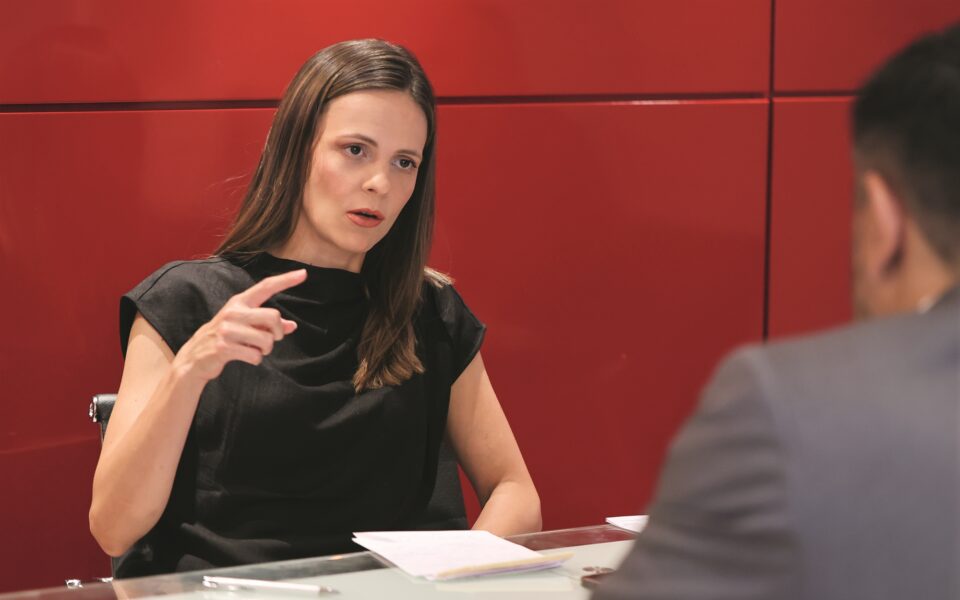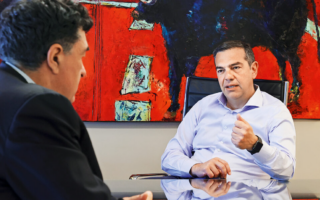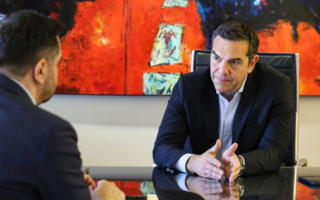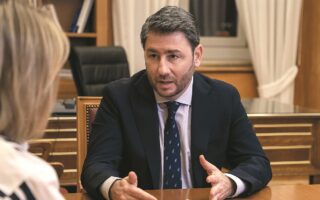‘This downward spiral must stop’
The SYRIZA leadership hopeful says personal attacks are wrong, any candidacy is welcome in the race

SYRIZA lawmaker Effie Achtsioglou, considered by analysts as one of the front-runners to succeed Alexis Tsipras as the leader of the leftist opposition party, spoke to Kathimerini about her campaign, the criticism she has received from within SYRIZA, and the way the party will operate if she is elected president.
The 38-year-old, who previously served as a labor minister from 2016 to 2019, said there is no reason to meet with PASOK leader Nikos Androulakis and described the new body she is considering setting up if elected.
SYRIZA suffered a heavy defeat in the legislative elections held in May and June, leading to the conservative New Democracy party securing a second term and the resignation of party leader Tsipras.
The polls are scheduled to be held on September 10.
What have you understood from your interactions with the public on your tours so far? Why did SYRIZA, as the main opposition, manage to achieve a negative record since the restoration of democracy, shrinking to half of its strength?
The tours are well attended. People come in droves and we exchange thoughts. It is a very healthy reflex that they have left behind their disappointment and are now more concerned with the common anxiety of how our political power will be restored in order to be socially useful and effective. As for what went wrong, some things have already been said by Alexis Tsipras himself – that is, in the conditions of proportional representation, our overtures to the other progressive parties were treated more as an opportunity for these parties to attack us. SYRIZA was attacked by everyone and this led to the idea being formed among the public that there cannot be a sustainable form of government, a stable government [among opposition parties]. They were definitely issues of cacophony and polyphony, especially in the last few weeks, in the public debate, which again created a feeling of insecurity among the voters. However, I believe that such a result is not only a matter of the pre-election period. It shows perhaps larger [political] shifts.
Since you referred to specific social categories, do you think the pre-election slogan about “the impoverishment of society” was exaggerated? New Democracy got 41% in the elections, therefore the handouts seems to have somehow worked positively among the public.
My opinion on the economic policy of New Democracy is confirmed and substantiated by the data itself. The disposable income of Greek citizens decreased in the previous period. That is a fact. It is not my belief. It is also a fact that in the same period of time, a few large companies listed on the Athens Stock Exchange multiplied their profits, showing the highest profitability of the last 20 years. This is the imprint of a policy that produces economic inequalities. Now, if the citizens’ perception of their daily life was far from the language or the way SYRIZA communicated real issues, that’s another issue, which we obviously have to take into account in our self-criticism.
There is an old statement of yours which has been repeated several times, which was that “normalcy is never an opportunity for the Left.” Shouldn’t it be an opportunity, though? Should SYRIZA be constantly identified with anger and rage?
I was not talking about normalcy in general, but about neoliberal normalcy. However, to reverse the question. What is our normalcy today? A summer during which the whole country burns and the greatest ecological disaster occurs and human lives are lost? Is it the absence of the state and the self-appointed vigilantes, with the government legitimizing the fascistization of society? Is this normalcy? I believe that this is not a situation that we should allow or that Greek society can tolerate. Is it normal to have the first summer when most Greeks could not go on vacation for a single day? To have phenomena of extreme violence, as we saw with the far-right hooligans who entered the country, crossed half of Greece, got onto public transport and murdered a man? To see employees sinking in the water, almost drowning, so that they can earn a wage [Achtsioglou is referring to a photo published in the media of a waiter wading through water to serve drinks to customers laying on sunbeds in the sea] and at the same time the minister of labor stating that he does not see anything wrong? This situation is a situation that [Prime Minister Kyriakos] Mitsotakis is trying to establish as normalcy in Greek society. He invests in a society of fear and zero hopes. I have the deep conviction that Greek society deserves, can and must have a much better reality.
There is a lot of talk about the political center and the relationship that SYRIZA should have with it. You keep saying that you don’t want to wear any such labels. If you are elected party president, will you have a meeting with PASOK-KINAL leader Nikos Androulakis to see what can be done from now on?
SYRIZA’s identity, its starting point, its value and theoretical load, is undoubtedly on the Left. At the same time, SYRIZA is a governing party. It addresses the largest possible audience. We seek to talk to, influence and convince as large a part of Greek society as possible. Obviously, this also concerns people who place themselves in the political center, it concerns people with whom we can find common ground on crucial issues, but who do not feel a complete ideological identification with us. [We appeal to] young people mainly, but not only, who feel that politics may not concern them. We seek to speak, influence and convince those people too. Politics is not something that hovers, nor do people carry specific labels where we choose which ones to address. We don’t just appeal to people who have been convinced by us. We seek the maximum possible political and ideological influence. Obviously, this also requires us to listen to the people.
‘I will not seek a meeting with Mr Androulakis. There was a time when we made open overtures to the party, but PASOK chose to keep an equal distance between SYRIZA and New Democracy’
Would you meet with Nikos Androulakis?
The parliamentary and public debate is always ongoing, as are the positions of the parties on every issue that concerns the country. What people are looking for from the parties are positions and proposals, a healthy confrontation. Everything is said publicly, in front of all citizens. Therefore, I do not think anything more is needed, nor will I seek a meeting with Mr Androulakis. Besides, there was a time when we made open overtures to the party, but PASOK-KINAL chose to keep an equal distance between SYRIZA and New Democracy, which obviously made it easier for Mitsotakis. In fact, before the first election, he said that he could potentially cooperate with New Democracy.
There is a criticism leveled apparently by your opponents within the party that you are doing a low-key tour or not talking about leftist and centrist policies because you don’t want to clash with anyone. And that you don’t want to clash because you appear to be leading the race.
I do not accept that it is a low-key tour. I have traveled almost all over Greece, I communicate and present my political position and my organizational proposals with intensity and clarity. I don’t think the effectiveness of a campaign can be judged by the noise it makes. It is judged on the essence of its contact with people. If you mean that our pre-election campaign lacks attacks between the candidates, I consider that to be political civility.
How do you see the candidacy of Stefanos Kasselakis?
The process is completely open and we mean it. This is what the party statute provides, this is what we have agreed. That is, anyone who wants to can come and claim the support of the voters, of the current members of the party and of those who will come that day to the [election] process. Therefore, in that sense, it is perfectly welcome.
One of the criticisms leveled at him is that he has not worked his way up in the party.
There are no such conditions for participation. Each candidate submits their political and organizational position for the operation of SYRIZA. Obviously, through his candidacy, he is presenting his journey and his personality and his special characteristics. In the end, the only and ultimate judge will be the voters. It is important that there is large participation, that interested citizens come, those who look toward SYRIZA, progressive democrats, who want to do their bit toward the future.
Since many people in SYRIZA consider you to be the front-runner, do you think that the last-minute candidacy of Stefanos Kasselakis shifts the balance?
I don’t think that each of us has a specific pool of voters from which someone can come in and take them away. We have five completely distinct candidacies – that is clear. Each of us comes with our personality, our experience, our political positions, our organizational proposals and tries to convince the largest possible number of participants.
Will you respond to the criticism leveled by SYRIZA lawmaker Pavlos Polakis? The other day he criticized you about your statement concerning journalists [Polakis appeared to criticize Achtsioglou for giving an interview to a journalist who has lambasted Polakis’ actions and comments in the past].
I understand the need for every comrade to express themselves or take a position in this process of electing the president of SYRIZA. What I do not understand is the insistence of some comrades to make personal attacks, because this is what it has come to, or to try to claim that there are some kind of dark centers behind a specific nomination. This downward spiral must stop. We must put forward our collective goal, which is the ideological and political defeat of [ruling] New Democracy and the prevalence of our own proposal and the effort to re-inspire Greek society for a better future. As far as I’m concerned, I don’t feel that I have to prove myself. Neither against any slander nor in any dirty war. I have followed a political path, I have political work to show, both as a minister and as shadow finance minister in the main opposition.
I’m just trying to imagine the next day if you are elected president. How will you coexist with Polakis, who compared the race to a “beauty pageant,” or now that we see that he has openly supported the candidacy of newcomer Stefanos Kasselakis?
You may have heard it when I talk about running the party the day after the elections, with me as president. I am very insistent on everyone following the rules, from the president to the members – that is, operating in a way that does not depend on persons or relationships or friendships. I start in reverse, that is, with the positive thought that my own election will also mean a collective commitment that the rules will be respected by everyone. Obviously there will be democracy within and debate, but once a decision is made, it will bind us all and be respected by all.
Do you believe you can beat Kyriakos Mitsotakis?
Yes, otherwise I wouldn’t be running as a candidate. I am running so that SYRIZA can regain its momentum, exercise a structurally strong opposition today and quickly return to government. Not for the sake of SYRIZA, not for us, but because, through this vehicle, there can be a better day for Greek society.
Is there a specific change you are already thinking about in the way SYRIZA operates? A creation of some new body or structure?
A basic problem that exists and is brought up daily in my tours by members of SYRIZA is their feeling that they were not being heard. That their view did not reach high [in the party]. There should be a structure beyond what we already know, which will act as a body for transferring decisions of the member organizations, and therefore the opinion of the members themselves, to the political secretariat and the president. It will then be an organic part of the political positions and discourse of SYRIZA.
We talk about your vision for the party. What is your vision in politics?
At its core is the belief that Greek society can and should live better. And that is why key priorities are the reduction of inequalities with clear redistribution policies, the building of a dynamic economy through the development of all productive sectors, therefore the expansion of the domestic production base, and security through public infrastructure and high quality services in health, education, social protection and a clearly regulated labor market. A necessary condition is a state that leads, intervenes, regulates in the direction of the above aims.





